Our Corps parades (meets to train) each Thursday night at Mewata Armouries. Parade times are 6:15 to 9:30 PM. Each Cadet is expected to arrive at Corps functions on time. If for some reason, a cadet will be late or is unable to attend that evening’s parade, the cadet or his/her parent/guardian is asked to call the Corps office (403) 263-1796 or their section commander and leave a message so the Corps staff will know OR fill out the Absence Report Form (found under Top Cadet Resources on the right-hand-side menu). Up-to-date information on Corps activities can be found on the Corps blog – click on Blog from the top menu.
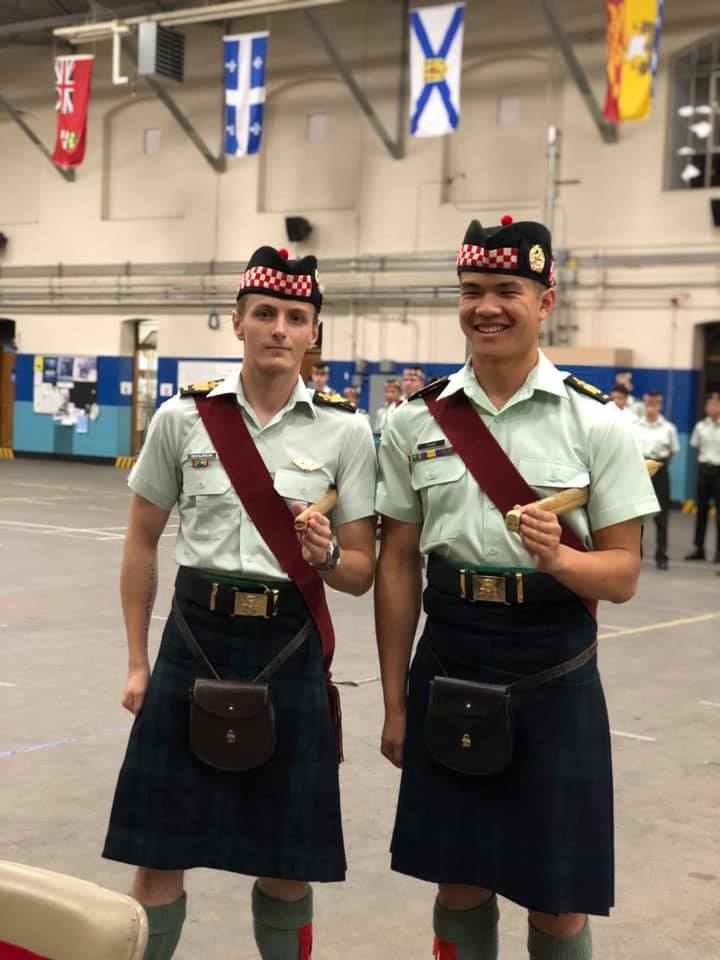
Every Cadet is expected to wear his/her appropriate uniform to each parade night or field training exercise (FTX) unless they receive special instructions to the contrary. Some of the following answers address questions about our uniforms, training and field training exercises. More detailed information on our uniforms can be found in the “2137 RCACC Orders of Dress” document located under the “Top Cadet Resources” section in the left sidebar.
Some Questions Frequently Asked by Parents and New Cadets
1. What is the goal of the Royal Canadian Army Cadet Corps (RCACC)?
Three aims of the Cadet program are:
- To develop in youth the attributes of good citizenship and leadership;
- To promote physical fitness; and
- To stimulate the interest of our youth in the sea, land, and air activities of the Canadian Armed Forces
For more detailed information, please go to the Canadian Junior Rangers and Cadets website at www.cadets.ca.
2. How often do Army Cadets train?
Under normal circumstances, Army Cadets train one night per week. Our corps trains on Thursday evenings and generally has one weekend activity each month which include day trips and overnight weekend training exercises. However, because of COVID-19, the cadet program has had to make adjustments in how they execute the program. Currently, we still train Thursday nights, but the cadets have been split into cohorts to maintain social distancing. Two cohorts will be parading in-person while the other two cohorts will do virtual training. There will be no overnight training, but we will be offering more one-day training activities on the weekend.
3. Who can join and what’s the joining process?
Cadets is open to all teenagers ages 12 to 19 inclusive. We will provide the necessary enrollment application forms when you visit our Corps on a Thursday training night. For liability reasons, your son or daughter can start to participate in our Corps activities only after their application and health information forms have been completed, signed and submitted to our Corps Administration office. Once they have formally joined, we hope they will find the training interesting; believe they can have fun learning from our group of young people; be willing to commit to regular attendance on training nights; and decide Army Cadets “is for them.” We understand that school work and family commitments will from time to time, take precedence and we allow for occasional training absences. But at the same time, the Officers, Civilian Instructors (CI), Civilian Volunteers (CV), and the most senior Cadets are evaluating every Cadet’s enthusiasm, commitment and dedication. They are always asking themselves: is this Cadet trying to learn? Are they enjoying the activities and having fun? Are they adjusting and fitting into the Corps? After about 3 or 4 weeks one of the Officers will interview the Cadet and make a decision. We also like to talk to the parents/guardians to get their perspective. We always welcome your questions, so please feel free to talk to any of the staff members or ask questions about our Corps or the Cadet program in general.
4. When do I get my first uniform?
Before new Cadet recruits are issued their first Cadet uniform, we ask them to attend Thursday night parades in a white shirt, dark pants and dark dress shoes. For Sports Nights, our Corps asks all Cadets to wear their blue 2137 Corps T-shirt, Field Training Uniform (FTU) pants (no tights or spandex pants/slacks) and running shoes. New Cadet recruits can substitute sweat pants until they are issued their FTUs. For Fitness Testing we ask our Cadets to wear their blue 2137 Corps T-shirt, shorts and running shoes.
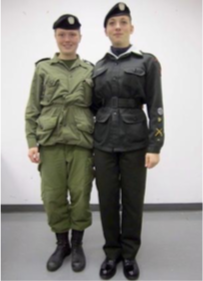
Our Cadets are issued the RCACC (Royal Canadian Army Cadet Corps) uniform first, followed by the RCACC Field Training Uniform (RCACC FTU) (aka as Combats). The Cadet on the left is wearing the olive green RCACC FTU uniform and the other Cadet is wearing the dark green coloured RCACC uniform. The RCACC uniform is called C1A/C1H – Ceremonial Dress (aka as Parade Dress in our Corps) when it is worn with a tie, and C3B – Routine Training Dress when it is worn without a tie. Detailed official information on RCACC uniforms can be found in CJCR Dress Regulations.
We use the following 6-step process to issue a new Cadet his/her first Cadet uniform:
- After you are officially enrolled as a Cadet, please come to Clothing Stores so we can take the measurements we need to issue you your first uniforms – your RCACC Ceremonial/Routine Training uniform (aka Parade uniform or DEUs) and your FTU uniform.
- We use the “Personal Cadet Measurement & Uniform/Equipment Order Form (Army)” you see posted outside of Clothing Stores to set aside all the uniform items you will need.
- If we don’t have an item in the size you need, we note it on the “Clothing and Equipment Ordering and Tracking Record” form you see posted outside of Clothing Stores.
- The 3-page “Individual Clothing and Equipment Record” form you see posted, lists the uniform items issued to 2137 Corps Army cadets. As a new Cadet or recruit, you are eligible for the Ceremonial/Routine Training (called DEUs on the Clothing & Equipment Record form) and FTU items listed on pages 1 & 2.
- In the meantime, wear a white shirt, black/dark pants and black dress shoes to Thursday night training sessions. If it is a sports night, wear your blue Corps T-shirt, sweat pants and running shoes. For fitness testing, wear your blue Corps T-shirt, shorts and running shoes.
- After attending about 4 Thursday night training sessions, come down to Clothing Stores and we will issue you your Ceremonial/Routine Training uniform (DEUs) and FTU uniform.
We maintain a detailed record of every item a Cadet has been issued in an “Envelope for Individual Clothing Equipment Record.” For additional information on our Corps Cadet uniforms and policies, click on the “Orders of Dress” tab. Since some of the Ceremonial/Routine Training uniform items are referred to as CF (Canadian Forces) DEU (Distinctive Environmental Uniform) by our supply chain, our “Individual Clothing and Equipment Record” form refers to both C1 and C2 uniforms as the DEU uniform.
5. What kind of training do Army Cadets go through?
Training is conducted at the 2137 Cadet Corps home location, Mewata Armouries, from roughly September 1st through to June 30th of the following year. As an Army Cadet, you will be trained in a variety of subjects such as drill, firearm handling, citizenship, and leadership. Some corps offer optional training: our corps offers a Pipes and Drums band. The Army Cadets program also offers advanced training courses such as exchanges to the UK and Scotland, advanced leadership training, regional, national, and international expeditions, just to name a few, as well as the Regular Force Basic Parachuting course. The training involves:
- Teaching the knowledge and skills outlined in the Army Cadet Star program. This program usually takes 4 to 5 full years for completion.
- Participation in citizenship activities
- Participation in physical fitness/sports activities
- Participation in optional training activities chosen by the Cadet, as time, expertise and resources permit
- HAVING FUN!
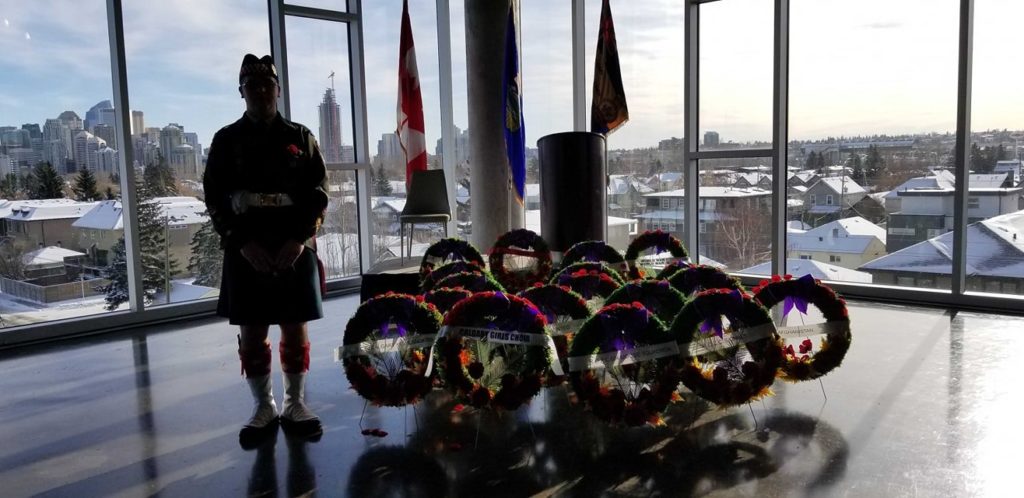
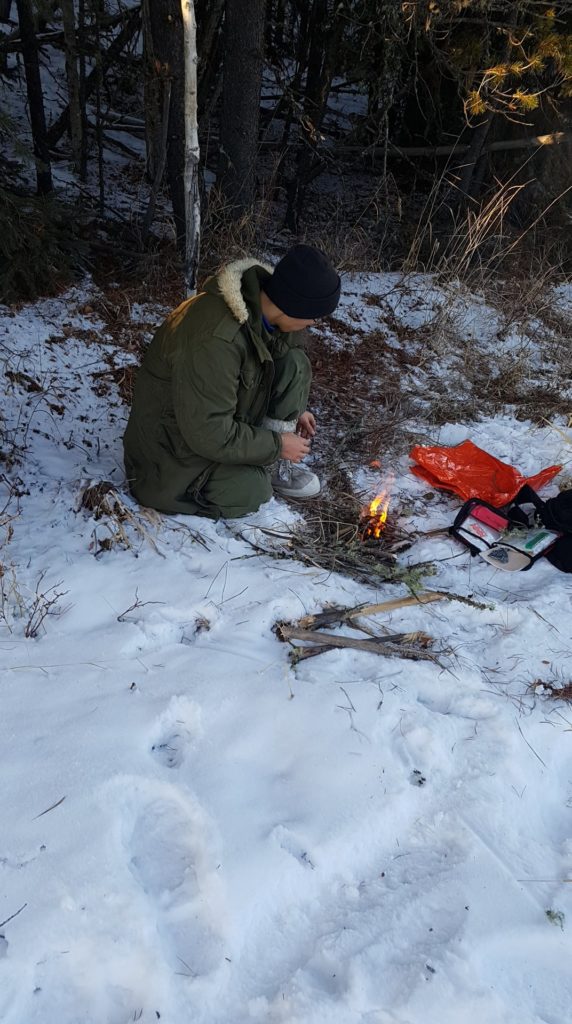

Corps training program consists of:
- Mandatory Subjects and Training – These are the subjects required by the Star level training program that must be taught as specified in the Corps Course Training Plan
- Complementary Activities – These are activities which must be completed to support mandatory training such as certain field training exercises (FTX) and public service involvement activities.
- Optional Programs or Training – These are voluntary activities that may be conducted during the training year to enhance the Cadet experience such as recreational shooting, biathlon, pipes and drums, drill team, orienteering, first aid, camping, mountain biking, scuba, rock climbing, rappelling (abseiling), etc.
Optional Training – Each Corps can organize and offer voluntary, optional activities that take advantage of local resources. These activities are offered as a complement to the Star Level Training Program. The Department of National Defense (DND) supports all training activities for Army Cadets by providing the equipment and training aids, rations, transportation and field accommodation for both winter and summer training.
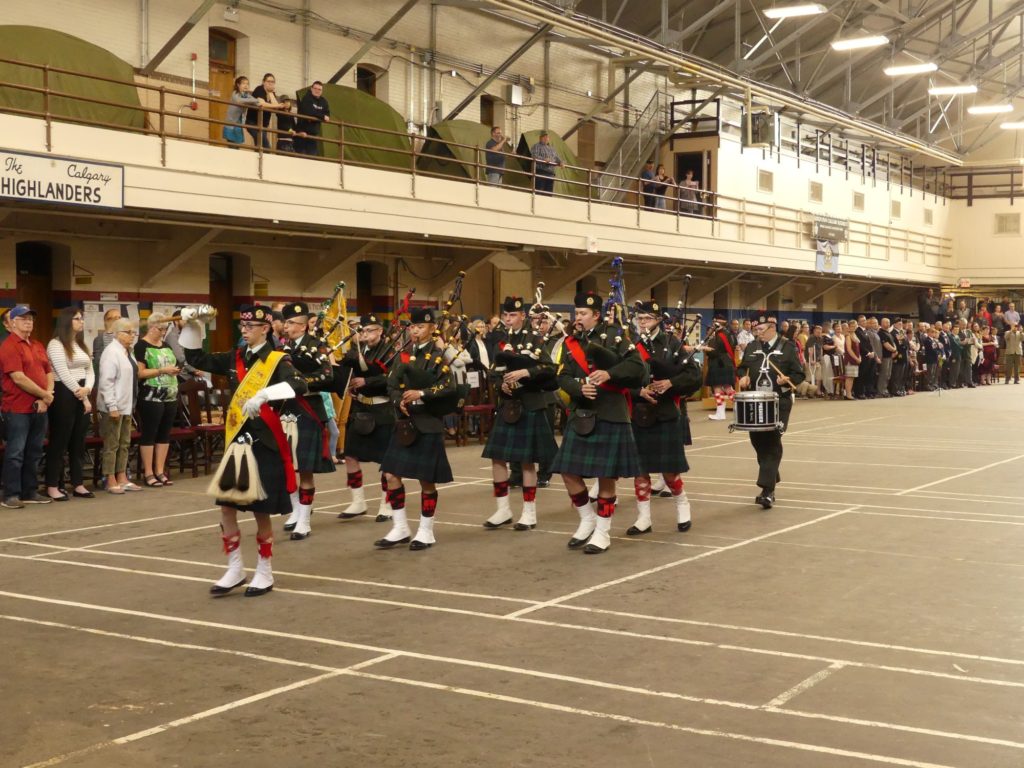
2137 Corps offers Pipes and Drums, Flag Party, and First Aid training. Pipes and Drums rehearses on Monday nights. Each new Cadet is required to participate in the required regular Corps activities before they can chose to participate in one or more voluntary, optional activities. Regular attendance on Thursdays is a prerequisite to participating in the optional activities. So subject to a Cadet’s attendance record, all Cadets are welcome and invited to participate in the optional activities. Beginning musicians, cadets with NO previous flag party or drill experience are taught the necessary skills fairly quickly. Other Army and Air Cadet Corps have joined our pipers and drummers for band training.


6. Do 2137 Cadets use firearms?
Yes we do. We use rifles for drill and ceremonial purposes, and for Biathlon and marksmanship training. We start by teaching and emphasizing the importance of safety. Before any Cadet ever touches a firearm they are taught and must follow all the firing range safety rules and regulations. Cadets shoot only at designated ranges under the strictest supervision of a specially trained, military Range Officer. Cadets start with air rifles shooting pellets. Biathlon Team members shoot special laser rifles. Later Cadets shoot .22 caliber rifles for marksmanship practice. Safety is always paramount when Cadets are handling firearms.
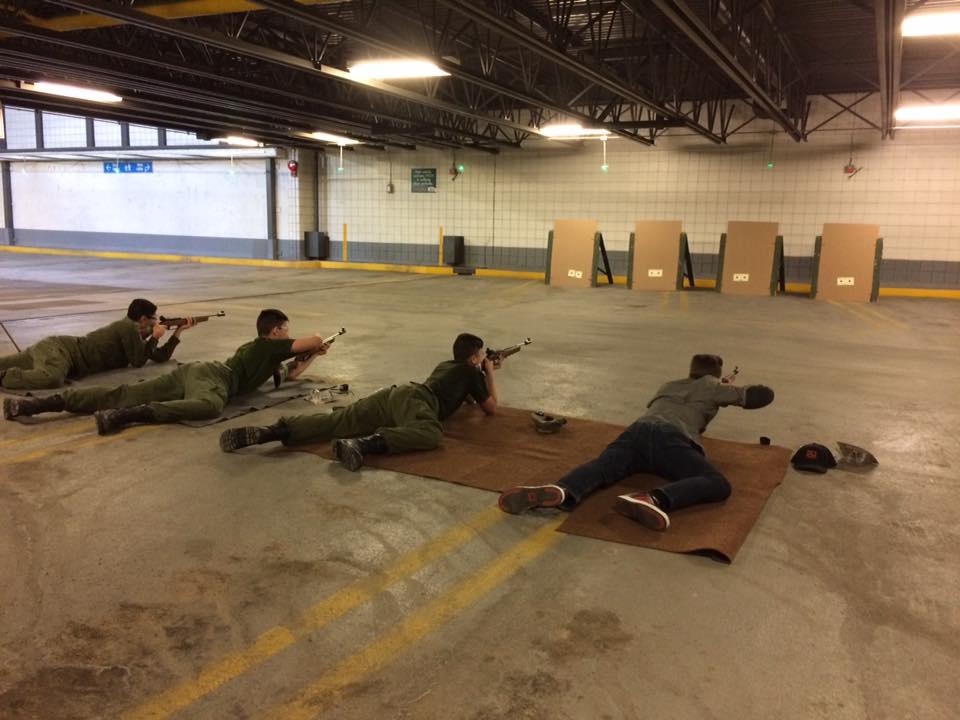
7. Who are the adults in uniform?

Photo of Major Sun, one of our Corps Cadet Instructor Cadre (CIC) Officers. The adults are Cadet Organization Administration and Training Service (COATS) personnel. COATS includes CIC Officers who are Commissioned Officers in the Reserve branch of the Canadian Armed forces, and who have taken specialized training in how to work with, teach and mentor young adults, or they are Officer Cadets (OCdt) who are in the process of becoming Commissioned Officers. There may also be Reserve or Regular Force soldiers who generously give some of their own time to help train the Cadets. Our Corps is very fortunate in having several people in this last category who work regularly with our Cadets.
8. There are some adults not in uniform—who are they?
They are Civilian Instructors (CI) who assist the rest of the COATS staff and CIC Officers with regular training and on field training exercises. They may also be Civilian Volunteers (CV) who volunteer their expertise and time to help out in Clothing Stores, with administration and on field training exercises. They all go through a rigorous security screening process called PRC/VSS (Police Reliability Check/Vulnerable Sector Screening).
9. Who else does the training?
More senior or higher ranking Cadets train the youngest and newest Cadets. Since one of the major goals of Army Cadets is leadership development, we emphasize this and Cadets get involved in training early in their Cadet career. Many of the senior Cadets who you see instructing classroom and drill lessons (and who also instruct on our field exercises) have taken specialized training during the summer. For the more senior Cadets, a significant portion of their training includes learning how to teach and then teaching.
10. Do the Cadets get yelled at by the more senior Cadets?

No. We don’t have any make-believe, Hollywood style, United States Marine Corps (USMC) Drill Instructors on our staff. We insist that everyone is treated with dignity and respect. However, we have to raise our voices on a large parade square (with terrible acoustics) and outdoors so all the Cadets on parade can hear the drill and marching commands. Some 80 Cadets could not hear anything if we used our normal indoor speaking voices. Occasionally you will hear a senior Cadet expressing his/her displeasure with a group of Cadets in a loud voice. They have chosen to do so because they believe the situation calls for it. We don’t allow anyone to be picked on individually. We do allow and encourage senior Cadets, who have been given the responsibility to do so, to correct individual behavior by speaking to the other person as an adult.
The Cadet movement is a national program focused on ensuring that harassment and abuse does not happen in any form at any Cadet activity. There is a compulsory training program that all Cadets must participate in every year. Those attending summer training programs receive it again at the site. The staff does not tolerate any harassment and neither do the Cadets. 2137 RCACC tries hard to be a friendly Corps.
11. What do I call the Officers and Civilian Instructors?
It depends if we are in the presence of cadets or having a private, one-on-one conversation. When Cadets are present we try to teach respect for adults or their elders (like their parents/guardians), people in positions of authority (like the CIC Officers, CIs, and CVs), and Cadets holding more senior ranks. You will notice that the Cadets all call us by our rank and name or by CI (Civilian Instructor) and our last name or CV (Civilian Volunteer) and our last name. Conversely, we all call them by their rank and last name. We also ask that they address one another in that same way. So in the the presence of Cadets we recommend using Sir or Madam.
When we are talking out of Cadet earshot, parents are welcome to call us Mr. or Ms. and our last name or just smile and confess that you don’t know our name. Officers in uniform will have name tags, which should help. Officers have a rank but we don’t expect you to know it, so we’re happy to explain. We’ll introduce ourselves to you if you tell us your name. We all have first names and feel free to use those when we’re talking in private. When in doubt you can always say, “Hi, I’m Bill Smith’s parent/guardian.” Our Corps staff photo, individual photos and staff biographies found under the “Our Staff” tab will help you connect names and faces.
12. What do you expect of me as a parent/guardian?
Primarily interest and encouragement in your Cadet’s progress and performance. We have a parent support group called the Unit Support Group (USG) with information under the tab by the same name. We invite you to join USG; attend their meetings if you can; and express your opinions. USG also does some fund raising for activities not supported by DND or the Army Cadet League and always appreciates your help. It’s not that often. If you have a special skill or background that you think might be of interest, we’d like to know that too. All of us work very hard to make the program a success and occasionally we’d like some help. A couple of times a year we sit down to eat as a Corps “Family” and we ask for help with the food. There are some things that the Corps needs that are simple sewing/building projects so please ask us if you’re interested. We would also appreciate promptness in picking up your Cadet at 2130 hrs (9:30 pm) from the weekly training and at the end of our field training exercises (FTX) on Sunday afternoons.
13. Speaking of funds, what is this going to cost?
The Cadet program is provided at no cost to you. All of the funding for Army Cadets is provided by Canada’s Department of National Defence (DND) and the Army Cadet League of Canada. While the Cadets’ Ceremonial/Routine Training Dress uniform and Field Training Uniform (FTU) are furnished at no cost to the Cadet, these uniforms remain DND property and are issued on LOAN to the Cadet. Cadets are responsible for looking after their issued uniforms and returning them when they leave the Cadet Corps.
The Highland uniforms and specialized kit issued to Bandsmen, Flag and Drill party, Biathlon and Marksmanship Teams are purchased with non-public funds (NPF), thanks to the fund raising support of our Cadet Support Society. Many of these items are difficult to acquire and expensive to replace. So we ask Cadets who have earned the right to wear these specialized uniforms and kit, to take extra care in looking after their kit and return every item when they leave our Corps. For example, the C1H and C3B Highland uniform worn the cadets of our corps cost in excess of $ 1,500 CDN in 2016. This replacement cost fluctuates with the value of the Canadian dollar. Regimental kilts alone range from $ 800 to $1,000 CDN.
Cadets can attend most field training exercises (FTX) at no cost. However, we rely heavily on fundraising to cover the costs of extra activities that enhance the existing, supported program. These extra activities include FTXs such as our Solo Prep and Solo (two optional FTXs where we teach our cadets basic skills of survival and then select cadets are given the opportunity to put those skills to the test in a 24 hour survival challenge), or our Battlefield Tour (where a small group of senior cadets travel to Europe to learn about significant World War I and II battles that defined Canada as a country and where our affiliated unit distinguished themselves). The summer training offered at Cadet Summer Training Centers is also at no cost, and Cadets selected to go receive a small training bonus for each week they complete successfully. More on camps later.
14. I’m hearing some terms that I’m not familiar with. Where can I get some definitions?
We do use lots of standard military and cadet jargon, terms and acronyms, so it can be puzzling for parents/guardians. Check the document “Military Glossary” located here for an explanation of the many terms we use.
15. I hear that there are summer camps. Can our son or daughter go?
We offer all Cadets the opportunity to apply for Summer Training. These summer training opportunities are a privilege and we require first that the Cadet work hard at the Corps level on a weekly basis in order to be recommended. After we do that, the decisions are made in Winnipeg, MB at the regional level of the because the process is competitive. Nationally though, over 20,000 Cadets in Canada attend training during the summer. Since national funding levels dictate how many Cadets can go, we can’t send everyone who wants to go or who has earned the right to go.
The first summer training opportunity that Cadets generally attend is called “General Training” and is two weeks long, taking place in the Army Cadet Camp in Vernon, BC or at the Whitehorse, Yukon Cadet Camp. If they are selected for camp, transportation to and from camp is arranged for them. There are generally 3 sessions of General Training offered during the summer. Those selected are notified as soon as we hear, which often is not until May. Selection at the Corps level is based on attendance, achievement and attitude. To be eligible for summer camp, a Cadet must have joined the unit PRIOR to January 1st. More senior Cadets may earn $360 for completing a 6-week course, and some can earn up to $4,000 during the summer by working as staff instructors at summer camp.
16. Are Cadets expected to join the Canadian Armed Forces?
No. Cadets make absolutely no commitments regarding future military service, and are free to leave at any time. However, those who decide to join the Forces later on start out with the advantage of having learned valuable skills through Cadets.
17. How do we find out if regular training or field exercise plans have changed?
The Corps asks NCO’s to call midweek all the Cadets in their section or platoon, to let them know which uniform should be worn that week and any special instructions. Your Cadet will also have a phone list and should know the “chain of command” that they would use to ask questions. They should call the Master Corporal or Corporal who leads their recruit section – FIRST. Cadets and parents are also encouraged to check the Corps Blog site for the latest information.
18. Why do they have to bring their packs and clothing on the Thursday night before a field training exercise (FTX)?

Scouts aren’t the only ones interested in “being prepared.” The “Standard Personal Kit for Field Training Exercises (FTXs)” found under the Top Cadet Resources heading on the right-hand side menu is used for most of our FTXs. We do kit checks on the Thursday night before every FTX to ensure every Cadet has all the necessary clothing and equipment. The senior Cadets, called NCOs, check their packs with them and give them a list of any missing items. That’s how we ensure that Cadets are adequately clothed and prepared for any expected outdoor or weather condition. If your son or daughter does not have the clothing they need to be safe in any weather we may encounter, they will not be allowed to go on the FTX. Safety of your son or daughter is always a priority. For the first few FTXs, it would be useful to ask them after their Thursday night kit check if they had everything they needed. They should have made a list of anything they were missing. This is one reason we ask them to ALWAYS carry writing materials.
Finally, only Canadian Armed Forces pattern FTUs or “combats” are to be worn to Corps training and activities. Imitation Cadpat, American or British pattern clothing are not permitted.
19. What if my son or daughter doesn’t have all the camping equipment or outdoor clothing they might need.
We will provide any additional equipment and/or outdoor clothing to the cadet. There is no need to go out and purchase the equipment. For instance, for winter FTXs we usually supply winter parkas, mukluks (very warm snow boots), skis, ski boots, ski poles, snowshoes, double sleeping bags, ensolite pads (made from a closed cell foam for insulation), and rucksacks. Your Cadet will bring home a kit list for every FTX. Check our “Standard Personal Kit for Field Training Exercises (FTXs)” list for a listing of the clothing and equipment typically required on an FTX. Keep this list handy. Basically, Cadets need sufficient warm clothes, and more than you might think. Cold feet and cold hands tend to be the biggest problem for new Cadets. Two important words that may be new to your son or daughter: wool socks. For spring/summer FTXs a sleeping bag and ensolite pad are needed. The blue or yellow ensolite pad we issue provides essential insulation from the cold ground. It’s not for comfort. It’s for warmth. A large rucksack or backpack, (doesn’t have to be fancy) is better than a duffle bag or suitcase because sometimes Cadets have to carry their kit some distance. Check garage sales and websites such as Kijji for missing items.
20. What do they need on a weekly basis?
They need to show up in the right uniform – Ceremonial/Routine Training uniform (DEUs), FTU or sports gear. If they’re not sure what the dress is for that night, they should call the NCO in charge of their section or platoon. Your Cadet will have a phone list. You can also check the Corps Blog.
Other than that, the Ceremonial/Routine Training uniform (DEUs) needs to be clean and ironed and the boots need to be POLISHED weekly. Their field uniform (FTUs) should be clean and not obviously wrinkled, and their FTU boots should be BLACK and clean, not polished to a high finish. Learning to take care of clothing is another growth experience. Their NCOs will give them lots of guidance and advice on how to care for their uniforms. More detailed information can be found under the tab called “Care and Cleaning of Your Cadet Uniforms.”
21. What do I do if I have a problem or a question?
The simplest answer is to speak to one of the CIC Officers or a staff member. You can also leave a message for the Commanding Officer personally if you believe this is an important issue. The Commanding Officer can be reached at (403) 263-1796 or you can send an email to 2137army@cadets.gc.ca.